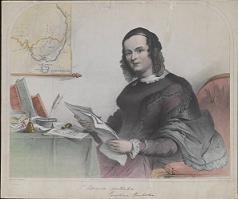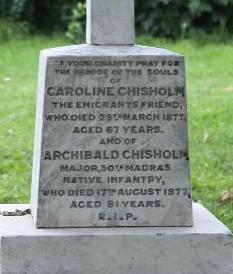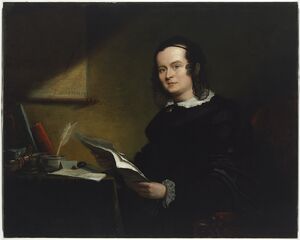| Caroline (Jones) Chisholm is managed by the Australia Project. Join: Australia Project Discuss: australia |
Contents |
Biography
Caroline Chisholm, known as the "Emigrant's Friend", was a 19th-century English philanthropist and humanitarian known mostly for her involvement with female immigrant welfare in Australia. She helped these new immigrants in New South Wales during the 1840s and 1850s, and later in the goldfields region of Victoria. She then worked to obtain support for immigrant families, lobbying politicians, publishing pamphlets, and starting a loan society to assist families looking to settle in Australia.[1]
Caroline Chisholm was born in Wootton, England. Her parents were William and Sarah Jones. He was a landowner and pig farmer. She was the youngest of a large family and was educated by a governess. Caroline married Captain Archibald Chisholm when she was 22 years old.[2] He worked for the East India Company and was thirteen years older than Caroline. They were married in a Church of England church, but Caroline converted to her husband's religion Roman Catholic.
Captain Chisholm was posted to Madras in India in 1832, and a year later Caroline joined her husband there. She asked the Governor of Madras for assistance in establishing a school after she had noticed that the wives and daughters of British soldiers were living in poverty and involved in crime and prostitution.[3]Caroline Chisholm founded the Female School of Industry for the Daughters of European Soldiers in 1834. They were given instruction in reading, writing and religion, cooking, housekeeping and nursing.[4]The school was taken over by the government when Caroline and her husband left.
The Chisholms decided to spend leave in Australia. They arrived in Sydney on the ship Emerald Isle in September 1838 with two children and settled at Windsor.[5][6] However her husband was recalled to active service in 1840 and Caroline and the children remained in New South Wales. Caroline Chisholm established employment agencies in rural centres. She found positions for immigrant girls and sheltered many of them in her home. In January 1841 she approached Governor and Lady Gipps and the proprietors of the Sydney Herald with a plan for a girls home. She was given use of part of the old immigration barracks for her Female Immigrants Home. This was dependent on public subscription. It held up to ninety-six women, and attached to it was the only free employment registry in Sydney. In 1842 the Female Immigrants Home was closed; she announced the closing of the home because her plans for dispersing immigrants into the interior had been so successful.
Because of her success in finding work for unemployed immigrants, Caroline later extended her work to include families as well as single women, and between 1841 and 1844 assisted 14,000 people to settle in New South Wales.
When Captain Chisholm retired from the army in 1845 he returned to Australia to work with his wife. Denied assistance from the government, the Chisholms travelled throughout New South Wales and collected over 600 statements from immigrants about their lives in Australia, this voluntary information to serve as a guide to those in England who wished to emigrate. With her husband she left for England in 1846 in the Dublin. Caroline Chisholm gave evidence before two committees in the House of Lords and gained support for some of her initiatives, including free passage to Australia for the wives and children of former convicts, but there was little official support for family migration.
Caroline Chisholm established the Family Colonization Loan Society in 1849, with the support of wealthy Londoners.[7] The Society lent migrant families the money they needed to travel to Australia: the emigrants belonging to her Society had to save most of the cost of their fares, and small loans were made to complete the cost. The loans were to be repaid within two years of arrival in Australia, and once they reached Australia agents would find them employment and would collect the loan repayments. By 1854 the Society had assisted more than 3000 people to travel to Australia. Caroline continued to agitate for reform, and the Passenger Act of 1852 was passed to ensure better shipboard conditions for migrants. Captain Archibald Chisholm left for Australia in March 1851 as colonial agent, leaving Caroline in England with her duties. Caroline toured Britain, Germany, France and Italy, where she visited Pope Pius IX. Her comments on shipboard conditions made the passing of the Passenger Act of 1852[8] possible.
Caroline Chisholm returned to Australia aboard the Ballarat in 1854 and toured the Victorian goldfields. Caroline wanted the construction of shelters for people traveling to the goldfields, a project which received support from the government. She also campaigned for land to be made available so that migrant families could establish small farms. Caroline developed kidney disease in 1857, and in November the family moved to Kyneton, where Archibald sat on the magistrate's bench and their two elder sons ran a store. Caroline still fought for reforms.
The Chisholms returned to England in June 1866 and were granted a pension of £100. They lived first in Liverpool, then at lodgings at Highgate, London. Caroline Chisholm died on 25 March 1877 and her husband died on 17 August just 5 months after Caroline. They are buried in the same grave at Northampton. [9] It bears a headstone inscribed:
Of your charity pray for the repose of the souls of Caroline Chisholm, The Emigrants Friend who died 25th March 1877 aged 67 years and of Archibald Chisholm, Major, 30th Madras Native Infantry, who died 17th August 1877, aged 81years. R.I.P.
Obituaries
There were several obituaries. Here is a selection:
- 'Death of Mrs. Caroline Chisholm.', Evening News (Sydney, NSW )
- 'THE LATE MRS. CHISHOLM.', Mount Alexander Mail (Victoria)
- 'THE LATE MRS. CHISHOLM.', The Argus (Melbourne, Victoria)
Legacy
- Her image marked the Australian $5 bill for 25 years, the first woman who was not a monarch to appear on Australian currency.
- She is commemorated on 16 May in the Calendar of saints of the Church of England.[10]
- There are proposals for the Catholic Church to also recognise her as a saint[11]
Sources
- ↑ The first reference to Caroline Chisholm in the press as the "Emigrants Friend" was in 1843 in the Morning Chronicle (Sydney). She was also known as the "Immigrant's Friend" in the The Sydney Morning Herald in 1845
- ↑ Northamptonshire, England, Church of England Marriages, 1754-1912
- Name: Caroline Jones
- Gender: Female
- Event Type: Marriage
- Marriage Date: 27 Dec 1830
- Marriage Place: Northampton, St Sepulchre, Northamptonshire, England
- Register Type: Bishops Transcripts
- Spouse: Archibald Chisholm
- ↑ Google Books - Encyclopedia of Women Social Reformers, Volume 1 page 151
- ↑ Unfeigned Love - Historical Accounts of Caroline Chisholm and Her Work - Memoir and the accounts of Mrs Chisholm's Philanthropic labours in India page 97
- ↑ SHIPPING INTELLIGENCE. from The Sydney Herald (NSW : 1831 - 1842) of Monday 17 September 1838, Page 2. first accessed online on the 30th of May, 2021 at: https://trove.nla.gov.au/newspaper/article/12855443
- ↑ https://trove.nla.gov.au/newspaper/article/32161280
- ↑ Trove Digitised Newspapers - South Australian Register 26th June 1851 newspaper article Family Colonization Loan Society
- ↑ Trove Digitised Newspapers - South Australian Register Monday 17 January 1853 Article Passenger Act 1852 passed
- ↑ Find a Grave -Caroline and her husband Archibald are buried together at Billing Road Cemetery also known as Northampton, Billing Road Cemetery.
- ↑ Wikipedia contributors, "Calendar of saints (Church of England)," Wikipedia, The Free Encyclopedia, https://en.wikipedia.org/w/index.php?title=Calendar_of_saints_(Church_of_England)&oldid=1017069572 (accessed May 30, 2021).
- ↑ The Age: Chisholm's supporters push for sainthood 24 October 2007 (accessed 31 May 2021)
- National Library of Australia
- Biography Caroline Chisholm
- Wikipedia Caroline Chisholm
- National Library of Australia, Trove: The Australian Women's Weekly, 10 December 1949, Caroline Chisholm friend of migrants
- Australian Broadcasting Corporation News: Five great Australians that we shouldn't have forgotten, 12 Aug 2017, accessed 16 Aug 2017
- 1947 'ONE SAINT FOR AUSTRALIA', The Sydney Morning Herald (NSW : 1842 - 1954), 30 January, p. 10. , viewed 31 May 2021,
- "Caroline Chisholm (1808 - 1877)", On the Job https://www.onthejob.education/life_job/famous_people/Caroline_Chisholm.htm
- Carole Ann Walker, Doctoral Thesis 2001, Loughborough University
CAROLINE CHISHOLM 1808-1877 : ORDINARY WOMAN - EXTRAORDINARY LIFE : IMPOSSIBLE CATEGORY https://core.ac.uk/download/pdf/288389921.pdf
Published Biographies
- Mackenzie, Eneas "Memoirs of Mrs. Caroline Chisholm : with an account of her philanthropic labours, in India, Australia, and England; to which is added a history of the Family Colonization Loan Society; also the question, who ought to emigrate? answered", Published London : Webb, Millington, 1852 https://nla.gov.au/nla.obj-52866095/view?partId=nla.obj-126863605#page/n0/mode/1up
- Goldman, Sarah “Caroline Chisholm: An irresistible force” Harper Collins, 2017. ISBN 9781460753439
No known carriers of Caroline's DNA have taken a DNA test.
Have you taken a DNA test? If so, login to add it. If not, see our friends at Ancestry DNA.
Featured Female Poet connections: Caroline is 21 degrees from Anne Bradstreet, 23 degrees from Ruth Niland, 34 degrees from Karin Boye, 35 degrees from 照 松平, 19 degrees from Anne Barnard, 41 degrees from Lola Rodríguez de Tió, 25 degrees from Christina Rossetti, 25 degrees from Emily Dickinson, 38 degrees from Nikki Giovanni, 26 degrees from Isabella Crawford, 21 degrees from Mary Gilmore and 21 degrees from Elizabeth MacDonald on our single family tree. Login to find your connection.
J > Jones | C > Chisholm > Caroline Elizabeth (Jones) Chisholm
Categories: Society of Australian Genealogists, 2023 Challenge | Australia, Postage Stamps | Australia, Profile Improvement - Colonial Australia | Unassisted Immigrants from Northamptonshire to Australia | Highgate, Middlesex (London) | Wootton, Northamptonshire | Emerald Isle, Arrived 15 Sep 1838 | Australia, Colonial Notables | English Philanthropists | Billing Road Cemetery, Northampton, Northamptonshire | Australia, Banknotes | This Day In History May 30 | This Day In History March 25 | Australia, Project Managed Profiles | Victorian Honour Roll of Women | England, Notables | Notables






The lines "A perfect woman, nobly planned, To warn, to comfort, and command" were originally written by William Wordsworth.
edited by Heather Stevens
“A perfect woman, nobly planned, To warn, to comfort, and command.” THE Priests and the Levites went forth, to feast at the courts of the Kings; They were vain of their greatness and worth, and gladdened with glittering things; They were fair in the favour of gold, and they walked on, with delicate feet, Where, famished and faint with the cold, the women fell down in the street. The Priests and the Levites looked round, all vexed and perplexed at the cries Of the maiden who crouched to the ground with the madness of want in her eyes; And they muttered — “Few praises are earned when good hath been wrought in the dark; While the backs of the people are turned, we choose not to loiter nor hark.” Moreover they said — “It is fair that our deeds in the daylight should shine: If we feasted you, who would declare that we gave you our honey and wine.” They gathered up garments of gold, and they stepped with their delicate feet, And the women who famished with cold, were left with the snow in the street. The winds and the rains were abroad — the homeless looked vainly for alms; And they prayed in the dark to the Lord, with agony clenched in their palms, “There is none of us left that is whole,” they cried, through their faltering breath, “We are clothed with a sickness of soul, and the shape of the shadow of death.” He heard them, and turned to the earth! — “I am pained,” said the Lord, “at the woe Of my children so smitten with dearth; but the night of their trouble shall go.” He called on His Chosen to come: she listened, and hastened to rise; And He charged her to build them a home, where the tears should be dried from their eyes. God's servant came forth from the South: she told of a plentiful land; And wisdom was set in her mouth, and strength in the thews of her hand. She lifted them out of their fear, and they thought her their Moses and said: “We shall follow you, sister, from here to the country of sunshine and bread.” She fed them, and led them away, through tempest and tropical heat, Till they reached the far regions of day, and sweet-scented spaces of wheat. She hath made them a home with her hand, and they bloom like the summery vines; For they eat of the fat of the land, and drink of its glittering wines.